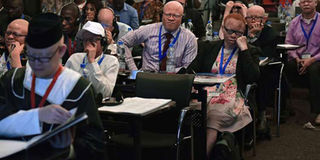Africa summit tackles violence against people with albinism

Delegates attend a regional conference on albinism organised by the United Nations to discuss potential measures and legislation to protect people with albinism in Africa from discrimination and superstitious attacks, in Dar es Salaam on June 18, 2016. PHOTO | AFP
What you need to know:
- Advocates for the rights of people with albinism discussed ways to safeguard and improve the lives of those who suffer discrimination, health problems and even murder as a result of the condition that leaves their skin without pigment.
- In Africa, the scorching sun makes people with albinism particularly susceptible to skin cancer while discrimination and prejudice sees them attacked or shunned in several countries.
DAR ES SALAAM
A “Miss and Mister Albino” contest, heavy sentences for ritual murder and concrete graves to ward off tomb raiders were all discussed at a UN summit on albinism concluding in Tanzania on Tuesday.
During the four-day meeting people with albinism and advocates for their rights discussed ways to safeguard and improve the lives of those who suffer discrimination, health problems and even murder as a result of the condition that leaves their skin without pigment.
It is a particular problem in Africa in general and in Tanzania in particular, which is why the East African nation was chosen to host the summit.
“Of all the regions in the world, Africa is the most hostile for people with albinism,” said Ikponwosa Ero, an independent expert on albinism.
Some 150 civil society and government representatives from 29 African countries, many of them albino themselves, gathered in Dar Es Salaam to swap experiences and ideas on improving security and integration.
In Africa, the scorching sun makes people with albinism particularly susceptible to skin cancer while discrimination and prejudice sees them attacked or shunned in several countries.
Albino graves have been looted and people killed to supply a grisly black market trade in albino body parts thought by some to bring good luck or wealth.
Under The Same Sun, a Canadian charity, has documented 457 attacks on albinos — including 178 murders — in 26 African countries mostly over the last decade, although the precise extent of the phenomenon is hard to define because of the secrecy surrounding the illegal trade in albino body parts.
EFFECTIVE CHEAP MEASURES
“The idea is to build a roadmap of simple, effective and cheap measures”, said Mr Ero, including basic protections such as ensuring people with albinism are surrounded by trusted neighbours and have a lockable door to their homes. It was also suggested that albino graves should be protected from body-snatchers by using cement to cover the graves so that the bodies can’t be exhumed.
Meanwhile, Ukerewe island in Lake Victoria offers albinos an abode. It started long ago when families would abandon their albino relatives on the island, believing their unusual, ghostly appearance was the sign of a curse. They survived and thrived and others, ostracised by society, made their way there too.
“In many respects, Ukerewe is at the forefront of integration of albinos in society.
‘‘And I think the fact that it’s an island plays a big part in the minds of people, but reality is a bit more nuanced,” says Harry Freeland, founder of the non-governmental organisation Standing Voice and the maker of a documentary about Ukerewe.
According to the Ukerewe Albino Society (UAS) there are 75 people with albinism living on the island of 200,000, a proportion roughly in keeping with the national average.
As elsewhere in Tanzania, body-snatchers have come to the island to dig albino corpses from their graves and in 2007 one person was attacked and had his white hair cut for use in witchcraft, says Vicky Ntetema, director of the Tanzanian branch of UTSS.
“But we have never had an albino murder,” points out Ramadhan Khalifa, president of Ukerewe’s albino community. “Ukerewe is unique in that sense,” says Freeland.





